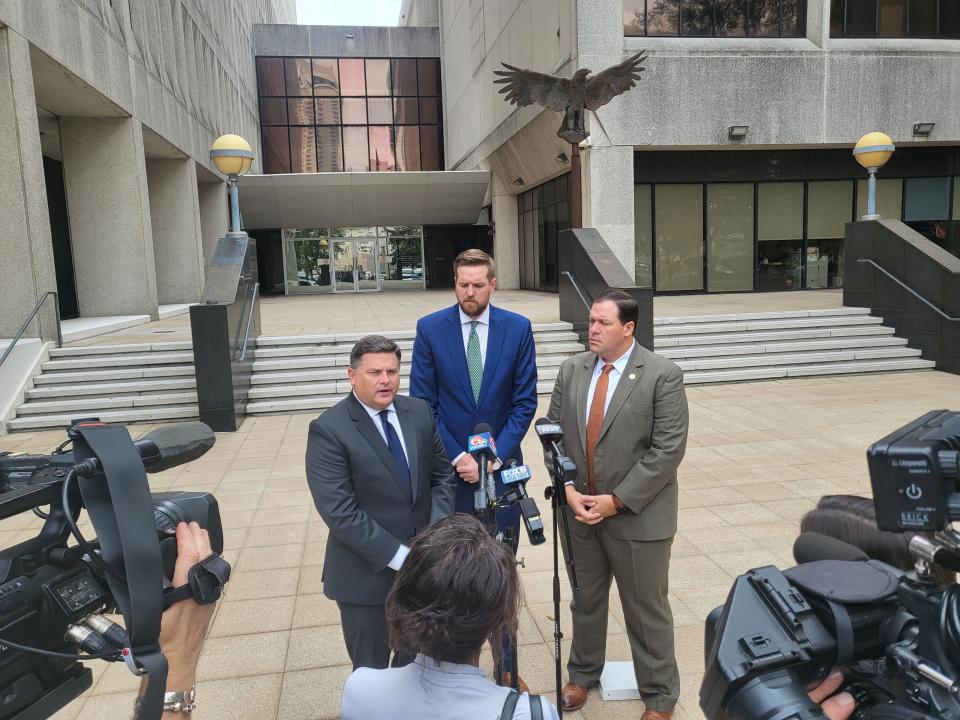FEAM representatives argue agency not required to make flood insurance affordable
A hearing began Thursday morning in the lawsuit 10 states filed against FEMA's flood insurance rate increases.
U.S. District Court Judge Darrel J. Papillion heard testimony Thursday morning from three of the five witnesses presented by Solicitor General Liz Murrill, who represented 10 states, 43 parishes, 12 levee boards, and more. Murrill is seeking an injunction to pause the Federal Emergency Management Agency's implementation of Risk Rating 2.0, the new way FEMA is assessing risks to price insurance.
The new flood insurance program, named Risk Rating 2.0, increases prices by 17.9% a year, limited by law. The average total increase to Lafourche will be 321%, and for Terrebonne, 305%. The hardest hit parish is Plaquemines, which will see a 545% increase.
Attorneys Yoseph Desta and Benjamin Takemoto of the Department of Justice represented the Federal Government.
"The argument that it has to make rates affordable isn't in the statute," Takemoto said.

Desta and Takemoto addressed many of the arguments the state would raise prior to witnesses taking the stand.
According to the two lawyers, the public was notified of the changes long ago, and waiting four years to bring a lawsuit undercuts the plaintiff's argument.
They also said the increase to the parishes' rates in their example was $2,900, which was not irreversible or irreparable, and that the 17.9% cap on yearly increases is a buffer to those affected.
"That would be like telling a plaintiff that's charged $10 a year they wouldn't be harmed if the government raised it to $1 million a year," Murrill said.
Papillion heard testimony from three of the five witnesses before noon: St. Charles Parish President Matt Jewell, Director of the Louisiana Governor's Office of Homeland Security and Emergency Preparedness Casey Tingle and Lafourche Parish Assessor Wendy Thibodeaux.
The first witness was Tingle, who often acts as the go-between for FEMA and parish and local governments.
He said FEMA sets the rules for how people and entities can qualify flood insurance. Those who have implemented the changes, Tingle said, feel as though FEMA has moved the goal post.
Furthermore, those who have applied for grants and spent them to mitigate their homes now must buy the increased flood insurance or the state must pay the money back to FEMA.
"They would be considered noncompliant and ineligible for assistance," he said.
Under the new system, emergency assistance still would be available for residents in the immediate aftermath of a disaster, but those who lack flood insurance risk foregoing assistance from FEMA during the rebuilding process, he said.
Jewell said that participation in the National Flood Insurance Program is voluntary, but not as simple as FEMA makes it out.
"If you want to write a mortgage in this parish, you probably should have flood insurance," he said. "It's about as voluntary as paying taxes."
St. Charles Parish has seen rates rise anywhere from 46% at the lowest, to 776% at the highest. Government buildings have gone from $400 to 500 to $3,000 to $10,000 to insure. Risk management and financial officers have recommended dropping the policies.
He said he intends to drop flood insurance, as well as most residents in his parish. His parish passed a millage to fund levees for protection to receive a discount on their policies.
After four negotiations, Jewell said, he learned they had inaccurate data on the levees.
"The problem was, the program had already been implemented and we were being charged under incorrect data," he said.
And because of that, building in flood prone areas has nearly washed up.
Thibodeaux said rate increases in Lafourche will reduce property values. As people cannot afford them, properties will be abandoned or sold under value.
"People will sell their properties under market value, under duress," she said. "I'm no longer valuing it at $100,000, I'm forced to value it at $50,000."
Property values create ad valorem revenue. Without that tax, critical government services like fire departments, schools, and law enforcement lose out, she said.
This will create a snowball effect of problems because abandoned properties become blighted, blighted properties attract crime and lowered tax revenue underfunds law enforcement, she said.
Still to speak are North Lafourche Levee District Director Dwayne Bourgeois and Lafourche Parish President Archie Chaisson.
The hearing was held in Section P courtroom in New Orleans.
This article originally appeared on The Courier: Attorneys say FEMA not required to make flood insurance affordable

